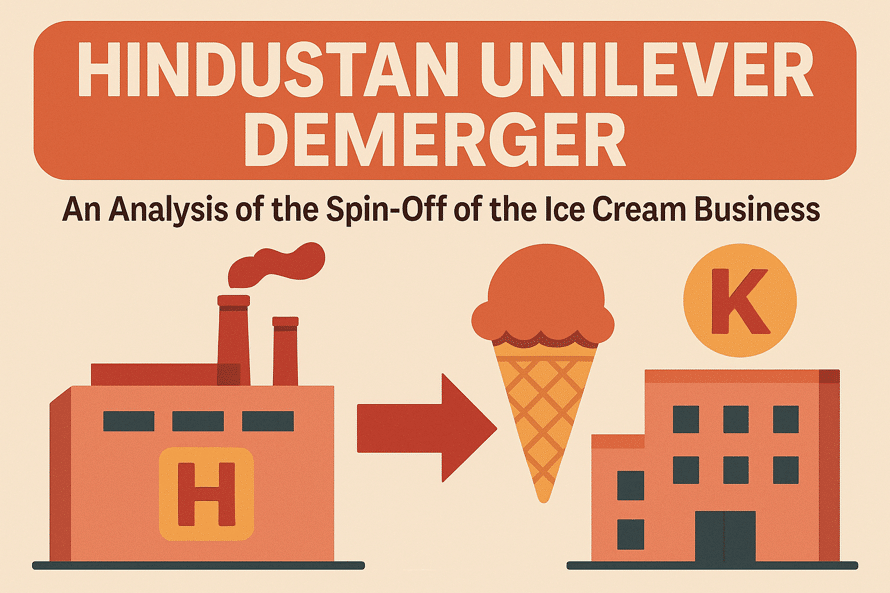
In a bold strategic move, Hindustan Unilever Limited (HUL)—India’s largest FMCG giant—has decided to carve out its ice cream business into a new, standalone company: Kwality Wall’s (India) Limited (KWIL). This demerger is part of a global push by HUL’s parent company, Unilever PLC, to streamline and separate business units for better focus and efficiency.
Let’s break this down in simple terms and explore what this means for retail investors like you.
Why Is HUL Spinning Off Its Ice Cream Business?
At first glance, it might seem puzzling. Why separate a well-known brand like Kwality Wall’s from HUL’s successful portfolio?
The answer lies in focus and flexibility.
Ice cream is very different from HUL’s core products like detergents, skincare, or food staples. It requires:
- Cold chain logistics
- Impulse-driven retail strategies
- Seasonal demand management
- Different capital allocation and margins
Unilever wants to give the ice cream unit its own breathing room. By operating as a separate entity, KWIL can better innovate, expand, and respond to consumer trends in the fast-evolving dessert space.
The Structure of the Demerger
Here’s the good news for shareholders:
For every 1 share of HUL, you’ll get 1 share of KWIL. This 1:1 share swap ratio ensures your stake remains proportional across both companies.
What will transfer to KWIL?
- Iconic brands: Kwality Wall’s, Magnum, Cornetto
- Ice cream factories, licenses, and cold storage logistics
- Employees, inventory, and liabilities related to the business
This ensures that KWIL starts off fully equipped as a self-sustaining business.
What’s in It for Investors?
1. Direct Ownership in a High-Growth Segment
As a separate listed company, KWIL gives you direct exposure to the booming Indian ice cream market, expected to grow fast with rising incomes, urbanization, and quick commerce.
2. Potential for Higher Valuation
HUL’s ice cream business contributed just 2.7% of its revenue in FY24 (~₹1,595 crore). But as an independent player, it could attract better valuation multiples compared to when it was buried inside a large conglomerate.
This could unlock what analysts call a “sum-of-the-parts” premium—meaning HUL + KWIL together might be valued more than HUL alone was before the demerger.
3. Portfolio Customization
You now have a choice:
- Stick with both HUL and KWIL
- Sell one, hold the other
- Increase exposure to the faster-growing brand
This gives you better control over your investment strategy.
HUL’s Bigger Picture: Slimmer, Sharper, and More Profitable
HUL isn’t just trimming fat—it’s refocusing.
While ice cream had brand value, it might have dragged down overall margins. HUL is now doubling down on:
- Beauty & Wellbeing (e.g., acquiring Minimalist for ₹2,960 crore)
- Core FMCG growth areas like hygiene and personal care
With the spin-off, HUL could emerge leaner and potentially more profitable, especially if ice cream had lower margins compared to the rest of its portfolio.
What Is Kwality Wall’s (India) Ltd (KWIL) All About?
Once listed, KWIL will be a pure-play ice cream company. It will hold:
- Popular brands with strong distribution across India
- Seasoned management with a clear focus
- Potential to scale via digital delivery, tier-2/3 expansion, and premiumization
But it’s not all smooth scoops. KWIL will also face:
- High working capital needs (due to cold chains)
- Seasonality in sales
- Intense competition from both local and global players
Yet, as a focused entity, KWIL can prioritize these challenges head-on—something HUL might not have done while juggling 30 other categories.
Timeline of Key Events
| Milestone | Date |
|---|---|
| HUL’s in-principle approval | Nov 25, 2024 |
| KWIL incorporation | Jan 10, 2025 |
| Final board approval | Jan 22, 2025 |
| BSE/NSE approval | May 14, 2025 |
| SEBI comments issued | May 13, 2025 |
| NCLT filing deadline | Nov 14, 2025 (expected) |
Regulatory green lights have already been secured from the BSE and NSE, with the NCLT approval expected in the coming months.
Analyst Views & Market Reactions
Market analysts have mostly welcomed the move. While some concerns about broader demand trends and inflation remain, the demerger is viewed as:
- A strategic move aligned with Unilever’s global roadmap
- An opportunity to unlock shareholder value
- A shift toward building stronger, focused businesses
HUL’s share price reacted modestly after the regulatory approvals—neither euphoric nor panicked—showing that the market is cautiously optimistic and waiting for post-listing performance data.
Final Thoughts: What Should You Do?
If you’re an HUL investor, this is a no-action-required event—you’ll automatically receive KWIL shares when the scheme is finalized.
However, keep these in mind:
- Track KWIL’s listing and future earnings reports
- Reassess your portfolio post-demerger
- Consider whether you want to stay invested in both companies or focus on one
HUL is streamlining. KWIL is preparing to scoop up market share. And for retail investors, this could mean a new flavor of opportunity.
FAQs
What is the name of the new ice cream company spun off from HUL?
Kwality Wall’s (India) Limited (KWIL).
What is the share swap ratio for HUL and KWIL?
1:1 – one KWIL share for every one HUL share.
When will the demerger take full effect?
After approvals from the NCLT, expected by November 2025.
What are the major brands under KWIL?
Kwality Wall’s, Magnum, and Cornetto.
Will KWIL be listed on the stock exchange?
Yes, once the demerger is complete and all approvals are received.
Will HUL shareholders get shares of the new company?
Yes. Every HUL shareholder will receive 1 KWIL share for each HUL share they hold.
Is this demerger good for long-term investors?
It could be. The move allows both companies to focus sharply, unlock value, and potentially improve operational efficiency.
Will the demerger affect HUL’s dividends?
Both HUL and KWIL can declare dividends independently, including for the period before the demerger becomes effective.
How big is the ice cream business for HUL?
It contributed about ₹1,595 crore in FY24, just under 3% of total revenue.




